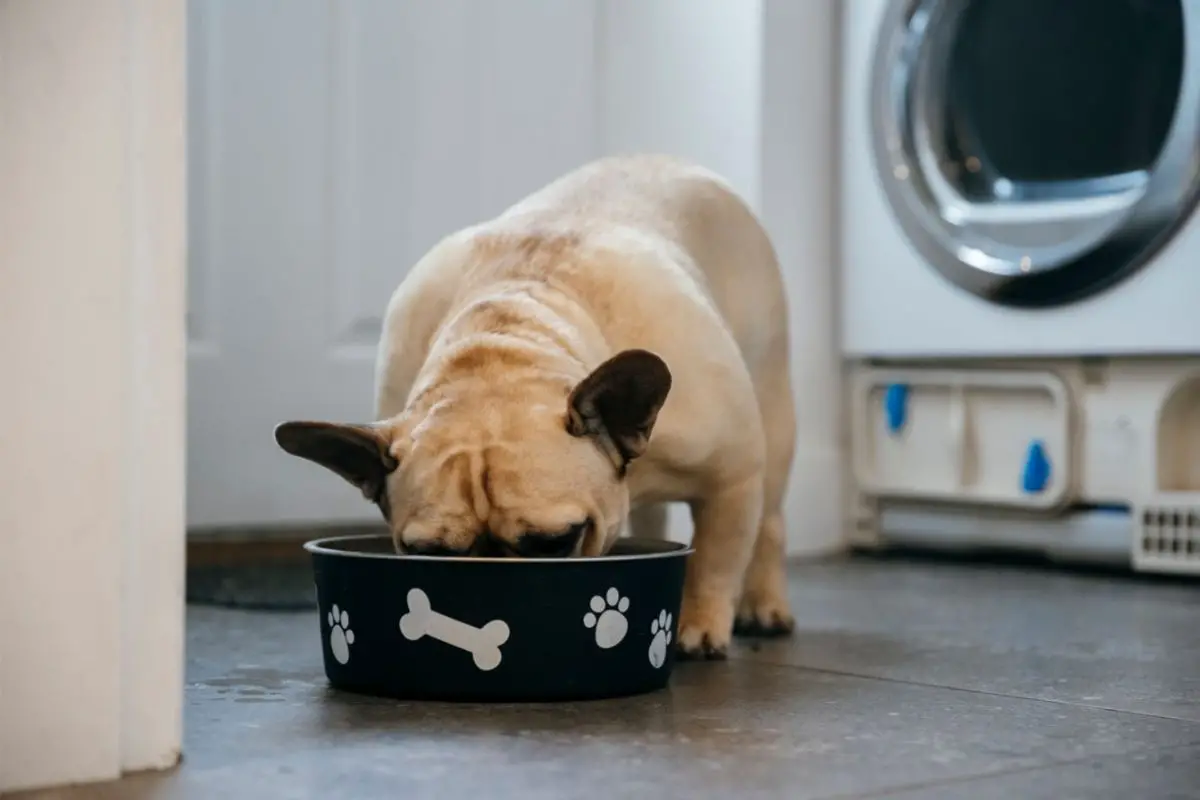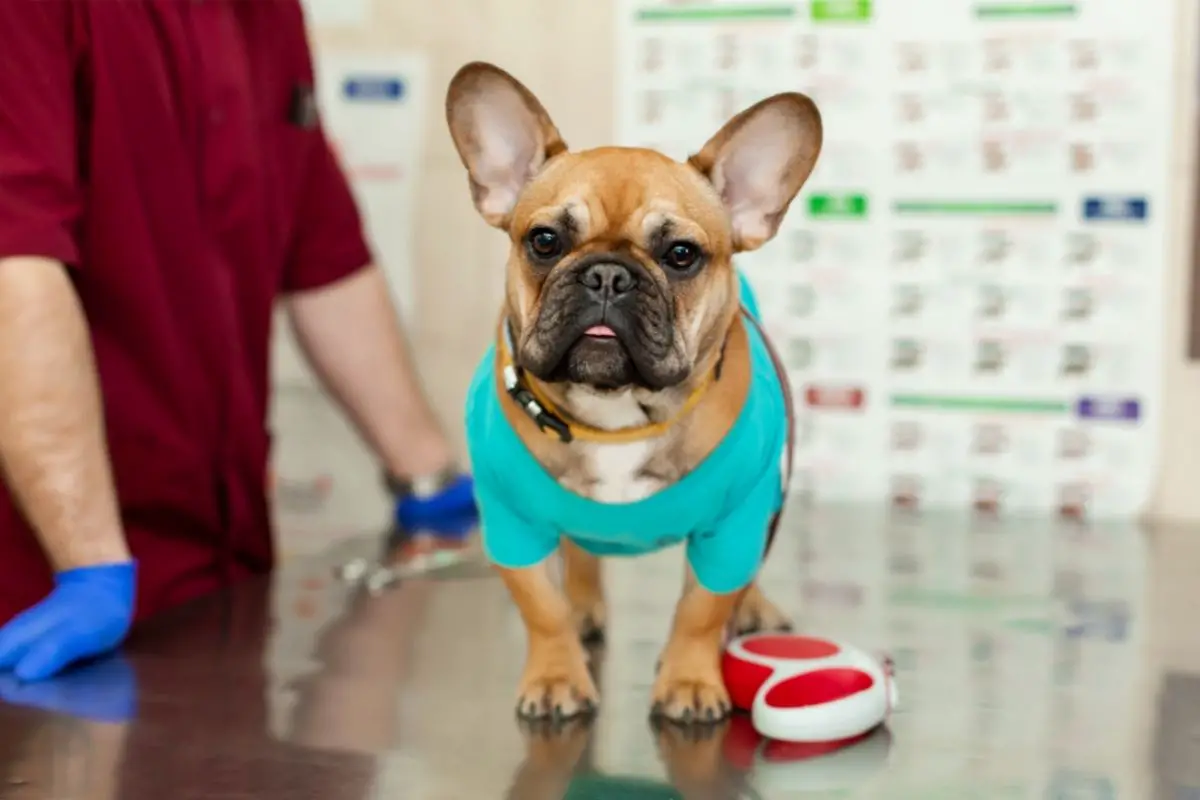Sadly, French Bulldogs are very susceptible to certain digestive issues and this leaves them prone to sickness and other such issues.
They have a stubby snout too and this makes it tricky for them to eat and drink properly.
The most common reason for a French Bulldog to throw up is because they have eaten something that was not meant for them.
This could be anything from food poisoning or an upset stomach to something more serious like internal bleeding or even appendicitis.
The best way to prevent your dog from eating things that are not meant for him is by keeping his diet and feeding schedule as regular as possible.
Why Is My French Bulldog Throwing Up Foam
One of the most common causes of vomiting in dogs is foam build-up on their tongues.
If you notice any foamy saliva coming out of your dog’s mouth, then this is probably due to a buildup of foam.
This can happen when your dog eats foods that contain high levels of fat. Letting your Frenchie lick a greasy plate may seem like a fine thing to do but it can lead to some issues.
This can include raw meat and fatty treats.
The problem with this is that if your dog has a sensitive tummy, then he will end up regurgitating the contents of his stomach.
What Is Brachycephalic Syndrome?
Brachycephalic syndrome is a condition that affects dogs who have been bred to look short and round in shape. French Bulldogs definitely fall into this category. Because of this, they tend to suffer from breathing problems and heart disease.
This can be the primary cause of vomiting in your bulldog as they are bred to be this way. It’s also worth noting that brachycephalic syndrome can lead to many health problems including:
Dogs with brachycephalic syndrome often have trouble swallowing and may choke on food.
They are prone to respiratory infections. They are also likely to develop heart conditions.
If you see any signs of your dog having trouble breathing or coughing, then you should take them to the vet immediately.
6 Reasons Why Your Bulldog Might Be Vomiting
Food Poisoning
Food poisoning is one of the most common causes of canine vomiting. This usually happens after your dog consumes tainted food or drinks.
Your Frenchie may be suffering from food poisoning if they show symptoms such as diarrhea, fever, lethargy, vomiting and loss of appetite.
There are some key signs that your Frenchie might be suffering from a food allergy:
- Vomiting
- Diarrhea
- Fever
- Lethargy
- Anxiety
- Skin Irritation
- Watering eyes
- Dullness of the coat
One method of helping with food allergies is to change the food that your animal is getting and to see if they suffer from any behavioral changes.
Eating Too Fast

Another common cause of canine vomiting is eating too fast. When your dog chows down on its food, they may feel full before they actually do.
When this happens, it may start to vomit. You should keep a close eye on your French bulldog’s eating habits so that you know what triggers their vomiting.
Here are a couple tips that I have found help avoid this issue:
- Try giving your dogs smaller meals more frequently throughout the day. This might reduce the chances of them eating too quickly.
- Use a ‘Flat Face Dog Food Dish” like the one below (this is the one my Frenchie Augie eats out of) to slow down how fast your dog gobbles up their food. What we do is feed him a half cup of his HA Purina dog food into this special dish. We let him eat that, then he barks letting us know he is ready for the second half of his cup and we pout that in . Since we have made this change he doesn’t throw up after eating anymore.
Or if they continue, at least they will not eat too much food so quickly.
Issues With The Esophagus
The esophagus is the tube through which food passes into the stomach. This is where your dog’s food gets digested and broken down.
A blockage in the esophagus can result in your Frenchie throwing up. This could be caused by a foreign object being lodged in the esophagus or a tumor.
Vascular Rings
It might also suffer from vascular ring disease. This would mean that there is an abnormal blood vessel that restricts the flow of blood to the esophagus.
This complication is something that the dog is born with and it will usually manifest itself after 6 months of being born.
If your dog is suffering from a vascular ring, then you should immediately take it to the vets. This can be treated with antibiotics and oxygen. It might also require surgery.
Esophagitis
It might also be suffering from esophagitis. This is when the lining of the esophagus becomes inflamed. Some of the symptoms of this condition include:
- Vomiting (especially yellow bile)
- Abdominal pain
- Difficulty swallowing
- Blood-tinged saliva
- Coughing excessively
- Neck pain
- Difficulty in lying down
- Increased weight loss
This condition can be managed by increasing the protein intake of your dog. This will help to strengthen the muscles in the esophagus.
You must be sure that you have no processed foods in your dog’s diet and make sure all their food is as organic as possible.
You can also have a balloon catheter installed in your dog’s throat that will help it to eat quicker.
Megaesophagus
Your dog could also be suffering from a condition called Megaesophagus. This means that the esophagus isn’t strong enough to push the food into the stomach and becomes lodged in the throat.
This condition is inherited, so there’s not much you can do about it once your dog gets it.
You should make sure that your dog is fully upright when it is feeding so that it does not choke on its food.
Hiatal Hernia
Lastly, your dog could be suffering from a hernia. A hiatal hernia occurs when part of the diaphragm separates from the muscle wall and allows some of the contents of the stomach to leak out.
This is quite rare in dogs but it can occur due to a number of reasons. For example, if your dog has had previous abdominal surgery, then it is likely that he will develop a hernia.
Another reason why your dog might get one is because of the way that his stomach develops.
If your dog was born with a large stomach, then it may stretch the muscles and cause the diaphragm to tear.
This might also occur in the throat, which will halt the process of food to the stomach and cause your dog to vomit or regurgitate.
There is some medication that your dog can take to reduce the amount of inflammation caused by the hernia.
Other Causes Of Your French Bulldog Getting Sick
The following are other causes of your French bulldog getting sick. These are more common than the ones mentioned above.
Gastroenteritis
Gastroenteritis is a general term for any type of gastrointestinal infection. It can affect both humans and animals.
In dogs, gastroenteritis often manifests itself as vomiting. The most common bacteria associated with this condition are Salmonella and Campylobacter.
Diarrhea
Diarrhea is another common problem affecting dogs and while it is not a cause of vomiting, it can certainly be an indication that your dog is sick and that is why it is vomiting.
In fact, diarrhea is the second most common health issue that dogs suffer from.
Diarrhea usually happens when the digestive system is too stressed. There are many different types of diarrhea, including watery diarrhea, bloody diarrhea, and even constipation.
Parvovirus

Parvovirus is an extremely contagious virus that affects dogs. It is very similar to human parvovirus.
If your dog catches this virus, he will exhibit signs such as lethargy, loss of appetite, vomiting, and diarrhea.
Food Poisoning
Food poisoning is another common illness that dogs suffer from. While it is not always related to vomiting, it is still a serious disease that needs to be treated quickly.
Food poisoning is caused by ingesting contaminated food.
Some foods that are known to cause food poisoning include raw meat, undercooked eggs, unpasteurized milk products, and certain fruits and vegetables.
Liver Disease
Liver disease is another common illness that affects dogs. Symptoms of liver disease include vomiting, diarrhea, weakness, depression, weight loss, and jaundice.
Your vet will need to perform various tests to determine what is causing your dog’s sickness. He will also have to rule out other diseases that might be present.
Kidney Failure
Kidney failure is a very serious condition that requires immediate veterinary attention. This is especially true if your dog is showing symptoms such as vomiting, lethargy, and lack of energy.
Urinary Tract Infection (UTI)
UTIs are actually quite common among dogs. They are typically caused by bacteria entering the urinary tract through the urethra.
Symptoms of UTIs include frequent urination, pain during urination, blood in urine, and increased thirst.
Cancer
Cancer is a very serious disease that can affect almost every part of the body. Dogs are no exception.
Cancerous tumors can develop anywhere in the body, but they tend to occur in the mouth, tongue, nose, ears, eyes, skin, lymph nodes, bones, or internal organs.
How Can You Help Your Sick French Bulldog?
The best way to help your sick dog is to take him to the veterinarian right away. Your vet will be able to diagnose his ailment and treat him accordingly.
If you notice any changes in your dog’s behavior, contact your vet immediately. These could be early warning signs of a more serious illness.
You can also start altering its food and see if that affects its behavior. We would recommend giving your dog boiled foods like rice and boiled chicken without any seasoning.
You should never try and solve your dog’s sickness without consulting your vet first, as you might make your dog’s condition slightly worse.
Can Your French Bulldog Vomit After Drinking Too Much Water?
Yes, your dog can vomit after drinking too much water. If your dog drinks too much water, his stomach may swell up and eventually rupture.
This can lead to severe abdominal pains, bleeding, and death. If you suspect that your dog has drunk too much water, call your vet immediately.
What Happens When Your French Bulldog Has An Appendicitis Attack?
Appendicitis attacks usually happen when your dog eats something that irritates the appendix.
The appendix is located at the base of the large intestine. It is responsible for storing waste matter until it passes naturally.
When this happens, the appendix swells up and becomes inflamed. Sometimes, the appendix bursts open and pus leaks into the surrounding tissues.
Appendicitis Attacks Are Very Serious
An appendicitis attack is extremely painful and can even kill your dog. In fact, it is one of the most dangerous illnesses that your dog can get.
In order to prevent your dog from having an appendicitis attack, you must keep him away from certain types of foods.
These include raw meat, eggs, dairy products, fish, shellfish, and anything else that contains fat.
Your dog needs to eat only dry kibble, canned food, and cooked meats. He should not have access to raw vegetables or fruits.
He should avoid eating anything with strong flavors such as onions, garlic, peppers, hot spices, etc.
Also, he should drink plenty of clean fresh water. This helps flush out toxins from his system.
How Can You Prevent Your French Bulldog From Being Sick In The Future?

There are many things that you can do to ensure that your French bulldogs stay healthy.
- You need to watch what you feed your dogs so that they don’t become overweight. They should have enough exercise and playtime.
- Make sure that they have regular checkups with their vets.
- Don’t let them sleep on hard surfaces. Make sure that they have soft beds.
- Keep them away from other animals.
- Keep them away from toxic substances. Don’t give them medications unless prescribed by your vet.
- Make sure that you have a bowl that will prevent your dog from eating excessively. This way, you can be sure that their stomach won’t rupture and they won’t start vomiting.
Do Older French Bulldogs Throw Up More Or Less?
Older dogs tend to throw up more than younger ones. However, there are some exceptions to this rule.
For instance, puppies often throw up after eating because their digestive systems haven’t fully developed yet.
Also, older dogs who have had surgery or been ill in the past may also experience problems with their digestion.
If you notice any changes in how your dog throws up, contact your vet right away.
Does Eating Raw Meat Cause A French Bulldog To Be Sick?
Raw meat can cause your dog to develop gastritis (inflammation of the stomach). Gastritis causes your dog’s stomach to produce excess acid which makes it difficult for him to digest food properly.
The best thing you can do is make sure that your dog doesn’t eat raw meat. Instead, cook all of his meals.
If you want to know if your dog has eaten too much raw meat, take note of how he looks. If his eyes seem bloodshot, he probably ate too much.
Veterinary Care For Your Sick Dog
When your dog gets sick, you should immediately seek veterinary care. There are several reasons why your dog might be sick.
One reason could be that he swallowed something poisonous. Another reason could be that he ate something that was contaminated.
Whatever the case may be, it is important that you see your veterinarian as soon as possible.
Can Vomiting Be A Result Of Anxiety In My Frenchie?
Vomiting is one of the most common symptoms of anxiety in dogs. This could be the result of your dog feeling panicked around humans.
This is very common in Frenchies that have come from abusive homes.
Your dog may vomit when he feels nervous or stressed.
One method of easing your dog’s anxiety is by ensuring that there is not much chaos around them and it has a relatively calm environment for most of the day.
Another way of helping your dog feel better would be to keep them occupied. It could help them relax and reduce stress levels.
What Are Some Signs That I Should Look Out For When My Frenchie Is Vomiting?
There are certain signs that you should look out for when your dog vomits. These include:
- Blood coming from his mouth
- His tongue hanging out
- Sticky yellowish material coming from his nose
- Watery diarrhea
You should also try to identify what substance caused your dog to vomit. The following are some things that you should avoid giving your dog:
- Medications
- Alcohol
- Sugar
- Carbonated drinks
- Chocolate
- Coffee
- Garlic
- Onion
Frequently Asked Questions
How Do I Know How Much Food To Feed My Puppy?
This question comes up quite frequently. You need to feed your puppy according to its age and size.
Puppies usually require about 4 times the amount of calories that an adult dog requires.
Puppies grow at such a fast rate that they will double their weight every two weeks.
An average puppy needs around 700 calories of food daily. This will need to be increased as the puppy grows larger.
How Can I Prevent My Dog From Getting Diarrhea?
Diarrhea is a fairly common problem in dogs. Most cases of diarrhea are due to dietary indiscretions.
It is important to ensure that your dog eats a balanced diet. This includes making sure that they get enough protein, carbohydrates, vitamins, minerals, fats and fiber.
It is also important to ensure that your puppy does not drink water with chlorine added to it. Chlorine can damage the lining of your dog’s intestines.
Can My Dog Sick From Eating Grass?
If your dog ingests grass, it can lead to stomach ulcers. This can cause your dog to become weak and lethargic.
Grass can actually be a good source of fiber for your dog and will encourage them to pass healthy stools. However, if your dog ingests too much grass, this can cause problems.
How Can I Keep My Dog Away From Poisonous Plants?
Some plants contain chemicals that can harm your dog. If you suspect that your dog has ingested any plant, contact your vet immediately.
Some of these plants include:
- Aloe Vera
- Angelica Root
- Ash Tree Leaves
- Bee Pollen
- Black Nightshade
- Blue Poppy Seeds
Our Final Say
We hope that our guide to why your Frenchie is vomiting has helped you to identify the cause and treat the problem accordingly.




